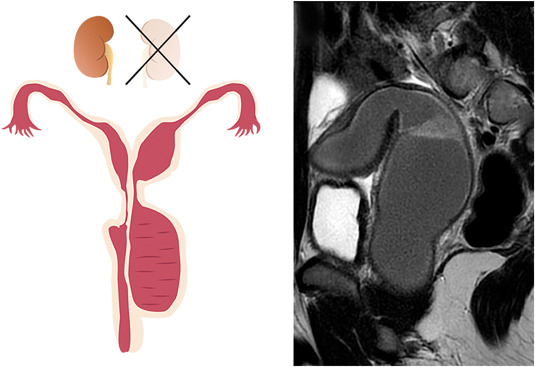
What is Ohvira Syndrome?
Ohvira syndrome, also known as Herlyn-Werner-Wunderlich syndrome (HWW), is a rare congenital anomaly of the female reproductive system characterized by a triad of features: uterus didelphys (double uterus), obstructed hemivagina (one-sided vaginal obstruction), and ipsilateral renal agenesis (absence of one kidney). This condition typically presents with symptoms such as pelvic pain, abnormal vaginal discharge, and menstrual irregularities.
How is Ohvira Syndrome diagnosed?
Diagnosing Ohvira syndrome often involves a combination of imaging studies and diagnostic procedures. Pelvic ultrasound, magnetic resonance imaging (MRI), or hysterosalpingography (HSG) may reveal the presence of a double uterus and obstructed hemivagina. Imaging studies can also assess the presence of renal anomalies such as ipsilateral renal agenesis. Additional diagnostic tests may include laparoscopy or hysteroscopy to further evaluate the reproductive anatomy.
What are the causes of Ohvira Syndrome?
Ohvira syndrome is thought to result from abnormal embryological development during fetal development. Specifically, it occurs due to a failure of the Müllerian ducts to fuse properly, leading to the formation of a double uterus. The obstruction of one side of the vagina and the associated renal agenesis are believed to be secondary to this developmental anomaly.
What are the treatment options for Ohvira Syndrome?
Treatment for Ohvira syndrome depends on the severity of symptoms and the individual's reproductive goals. Surgical intervention is often necessary to alleviate symptoms and prevent complications. Surgical options may include resection of the obstructed hemivagina (vaginal septum resection), removal of the obstructing tissue, and repair of any associated urogenital anomalies. Conservative management with pain medication and hormonal therapy may be considered for symptomatic relief in some cases.
What is the prognosis for individuals with Ohvira Syndrome?
The prognosis for individuals with Ohvira syndrome depends on various factors, including the severity of symptoms, the presence of associated anomalies, and the success of treatment interventions. With appropriate medical and surgical management, many individuals with Ohvira syndrome can achieve relief from symptoms and lead healthy, fulfilling lives. Regular follow-up with a healthcare provider is important to monitor for any potential recurrence of symptoms or complications.
What are the procedure after surgery?
Rest and Limit Activity : Avoid strenuous activities, heavy lifting, and vigorous exercise for the recommended period.
Keep the Area Clean : Gently clean the surgical area with water and mild soap as directed by your surgeon. Pat the area dry with a clean towel, and avoid rubbing or scrubbing.
Take Prescribed Medications : Take any prescribed pain medications, antibiotics, or other medications as instructed by your surgeon to manage pain and prevent infection.
Avoid Sexual Activity : Refrain from sexual intercourse and other sexual activities until your surgeon advises it is safe to do so. This typically takes several weeks to a month or more, depending on individual healing.
Wear Loose Clothing : Wear loose-fitting clothing, preferably cotton underwear, to minimize friction and promote airflow to the surgical area.
Attend Follow-Up Appointments : Keep all scheduled follow-up appointments with your surgeon to monitor your healing progress and address any concerns or complications promptly.
Avoid Tampons and Menstrual Cups : Refrain from using tampons and menstrual cups during your recovery period to prevent irritation and infection.
Stay Hydrated and Eat Nutritious Foods : Drink plenty of water and eat a balanced diet rich in vitamins and nutrients to support healing and boost your immune system.
Why choose VMG Hospital for the treatment of Ohvira Syndrome?
VMG Hospital in Hisar, Haryana, is a trusted provider of comprehensive gynecological and reproductive health care for individuals with complex reproductive anomalies such as Ohvira syndrome. Our team of skilled gynecologists, reproductive surgeons, and specialists has extensive experience in diagnosing and treating Müllerian duct anomalies, ensuring personalized care and optimal outcomes for each patient. With state-of-the-art facilities and a patient-centered approach, VMG Hospital is committed to delivering compassionate care and helping individuals with Ohvira syndrome achieve relief from symptoms and improved quality of life.